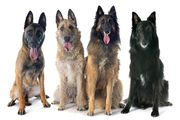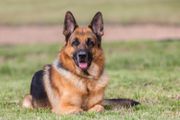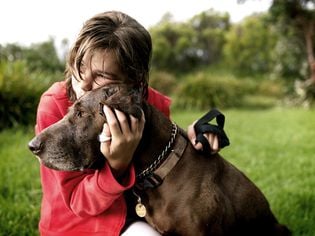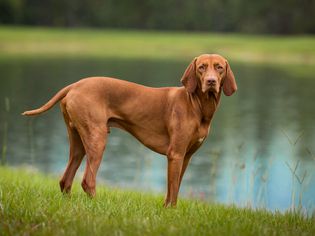The Belgian Sheepdog is a medium-sized herding breed from Belgium with pointed ears, a long snout, elegant posture, and a thick double coat with coarse black fur. This breed is the epitome of a hard-working livestock dog. Highly trainable and extremely intelligent, Belgian Sheepdogs were designed to perform a job—but they also have a sensitive, gentle temperament that craves human companionship, making them ideal family dogs.
A strong-willed breed, the Belgian Sheepdog is often referred to as “bright-eyed and bushy-tailed." They are exceptionally loyal, tending to be workaholics who aim to please. These shepherds always give their all when participating in any sort of activity, whether it be working a farm or simply playing in the backyard with their favorite humans.
Breed Overview
Group: Herding
Height: 22 to 26 inches
Weight: 55 to 75 pounds (males); 45 to 60 pounds (females)
Coat: Thick double coat with a dense undercoat and coarse outercoat
Coat Color: Black
Life Span: 12 to 14 years
Temperament: Alert, loyal, protective, intelligent, active
Hypoallergenic: No
Origin: Belgium
Characteristics of the Belgian Shepherd
These eager, athletic dogs have high energy levels and require plenty of daily exercise. Belgian Sheepdogs are a great match for active families that plan to take their dog along on hikes, bike rides, runs, or any type of outdoor adventure. When it comes to children, these dogs have especially loving and protective personalities. Belgian Sheepdogs get along well with other pets, but their instincts may lead them to herd smaller animals or young kids around the house. Thankfully, this intelligent breed is easily trainable and can learn appropriate behaviors quickly with guidance from its owners.
| Affection Level | High |
| Friendliness | High |
| Kid-Friendly | High |
| Pet-Friendly | High |
| Exercise Needs | High |
| Playfulness | High |
| Energy Level | High |
| Trainability | High |
| Intelligence | High |
| Tendency to Bark | Low |
| Amount of Shedding | Medium |
History of the Belgian Sheepdog
Belgium’s terrain and climate are ideal for both livestock and dairy farming. Belgian farmers were once focused on cattle, and breeding herding dogs was an essential part of farm life. In fact, there were once eight varieties of shepherds unique to Belgium. These dogs were officially classified for the first time in the 1890s. Today, the remaining breeds include the Belgian Sheepdog (also known as the Groenendael or Chien de Berger Belge), Tervuren, Malinois, and Laekenois. These dogs are all anatomically identical, but with coats that vary in terms of texture, color, and length.
The Belgian Sheepdog is the solid-colored (black), long-haired variety. The name Groenendael was given to these dogs by a man named Nicolas Rose, a renowned breeder of the time who operated a restaurant near Brussels called the Chateau Groenendael. In fact, Rose is thought to have purchased the foundation couple that began the Belgian Sheepdog breed.
The Belgian Sheepdog was listed in the Chien de Berger de Races Continentales (Continental Shepherds), a group that also includes German Shepherds, Briards, Hollander Herders, Bouviers, and Beauceron. In the late 1800s, efforts were made to propagate a Belgian dog for nationalistic purposes. The Club du Chien de Berger Belge, or Belgian Shepherd Club, was created and ultimately led to the Belgian Sheepdog's development.
By the turn of the 20th century, Belgian Sheepdogs became well-known for their versatility and hard-working nature outside of Belgium. Both Paris and New York relied on the breed as police dogs in this era, and they were often employed by customs agents to help identify smugglers. During World War I, they worked as ambulance dogs, messengers, and freighters of heavy gunnery, then went on to serve as war dogs during World War II.
The Belgian Sheepdog Club of America was formed in 1949, and since that time, the breed has worked as police and service dogs, competed in dog shows, and performed search-and-rescue work. Alongside their jobs, Belgian Sheepdogs have also become known as loving, loyal family pets.

Belgian Sheepdog Care
While the Belgian Sheepdog is typically easy to train, this dog needs considerable exercise every day to keep up with its high energy level. Owners should also prepare for routine grooming and two heavy shedding seasons each year.
Exercise
Like other herding breeds, the Belgian Sheepdog needs a sufficient amount of exercise for up to two hours each day. These dogs do not enjoy lounging around the house; they are alert, active workers that thrive when given a job to do. Belgian Sheepdogs also crave time with their humans, so as an owner, it's essential to exercise with your dog.
Rather than letting this breed roam around the backyard by itself, great ways to provide physical and mental stimulation include games of fetch or practicing new tricks. The Belgian Sheepdog isn't an optimal choice for owners that work long hours outside the home. This breed is likely to become bored and possibly destructive in the house, and it can also develop separation anxiety. Sheepdog owners should also keep safety in mind, as these dogs are hardwired to chase sheep, so they won't hesitate to take off after animals, joggers and cyclists, or even cars—so leashed walks and fenced yards are must-haves.
Grooming
When it comes to coat maintenance, the Belgian Sheepdog’s double coat—which consists of a dense undercoat and a coarser outer coat—is easier to maintain than you might think. However, it has a heavy shedding season once to twice each year that requires daily brushing to remove excess fur. Weekly brushings are sufficient during the rest of the year, along with occasional baths.
Like other dog breeds, you should also routinely trim your dog's nails, brush their teeth, and check their ears for dirt and debris buildup. Clean the ears as needed with an ear cleaner made specifically for dogs.
Training
Along with participating in daily exercises with your Belgian Sheepdog, it's also important to start training this breed early. Basic obedience lessons can begin when puppies are about eight weeks of age. Further training should continue throughout the dog's life with consistency and positive reinforcement. Methods involving punishment are not recommended, as they can be harmful to your dog's sensitive personality and bring out their strong-willed nature.
Thanks to their intelligence, Belgian Sheepdogs excel at advanced training like agility sports, obedience competitions, tracking, and herding. They're eager to please their owners, and they do best when training is kept positive and fun. Reward your dog with treats and affection for desired behaviors.
Common Health Problems
The Belgian Sheepdog is a sturdy, robust breed that is generally healthy. Like other purebreds, it is still prone to a few inherited medical problems. Responsible breeders strive to maintain high standards and test parent dogs before breeding. The Belgian Sheepdog Club of America notes that these dogs can be particularly sensitive to anesthesia, so your veterinarian should take precautions should the need for surgery ever arise.
Common conditions associated with the Belgian Sheepdog include:
- Elbow and Hip Dysplasia: Dysplasia causes a malformation in your dog's joints as they age, and may require surgery in severe cases to help the dog live comfortably.
- Progressive Retinal Atrophy: Also called PRA, this condition affects the retina in your dog's eye and eventually leads to blindness.
- Cataracts: Like humans, dogs can develop cataracts that look like cloudy spots on their eyes and impair vision. Some veterinarians may recommend surgery to remove cataracts.
- Epilepsy: This neurological condition causes seizures in dogs. Mild to moderate cases can usually be treated with medication.
Diet and Nutrition
The Belgian Sheepdog does well on a diet of high-quality dog food, either manufactured or prepared at home under veterinarian supervision. Fresh, clean water should be available at all times for this energetic breed.
Since these dogs are so active, they're less likely to become obese than other breeds. However, it's best to limit treats if you notice your dog gaining too much weight. Ask your veterinarian to help you determine a healthy meal plan based on your dog's age, weight, and activity level.
Where to Adopt or Buy a Belgian Sheepdog
Like other shepherd breeds from Belgium, the Belgian Sheepdog requires a serious commitment from its owners to be a well-mannered and happy companion. These dogs can end up in shelters when their families are not prepared for the time and dedication they require. If you're interested in adopting a Belgian Sheepdog, contact your local shelter to find rescue dogs and breed-specific rescues within your region.
When adopting a Belgian Sheepdog as a puppy, it's essential to do your research and work with a responsible breeder. You should be provided with the litter's family medical history, allowed to meet their parents, and able to see that the dogs are raised in a comfortable indoor location. Belgian Sheepdog puppies typically cost between $1,500 and $3,000, but prices may be higher or lower depending on pedigree and availability.
To start your search, check out resources like the national breed club, breed-specific rescues, and the AKC:
- Belgian Sheepdog Club of America
- Belgian Sheepdog Rescue Trust
- AKC Belgian Sheepdog Breeders
Belgian Sheepdog Overview
Intelligent, easily trainable
Loyal and affectionate with family
Hardworking, up for any activity
Very high exercise needs
Prone to separation anxiety
Can become destructive if left alone

More Dog Breeds and Further Research
If you love the Belgian Sheepdog, you might also like these similar breeds:
- Belgian Tervuren
- Belgian Malinois
- Dutch Shepherd
There are plenty of dog breeds out there that can join your family. With a little research, you can find the right one to bring home!
- Are Belgian Sheepdogs Good Pets?
While Belgian Sheepdogs can be great companions for experienced owners, this breed is not recommended for novice families. As herding dogs, they have very high exercise needs, require significant training, and can become destructive when left alone.
Are Belgian Sheepdogs Aggressive?Belgian Sheepdogs are typically not aggressive, but they must be socialized consistently throughout puppyhood to be friendly with other animals and strangers as adults.
What's the Difference Between a German Shepherd and a Belgian Sheepdog?German Shepherds and Belgian Sheepdogs may look similar, but Belgian Sheepdogs have longer, thicker fur and are smaller in size. As their names indicate, these dogs are separate breeds from Germany and Belgium.








